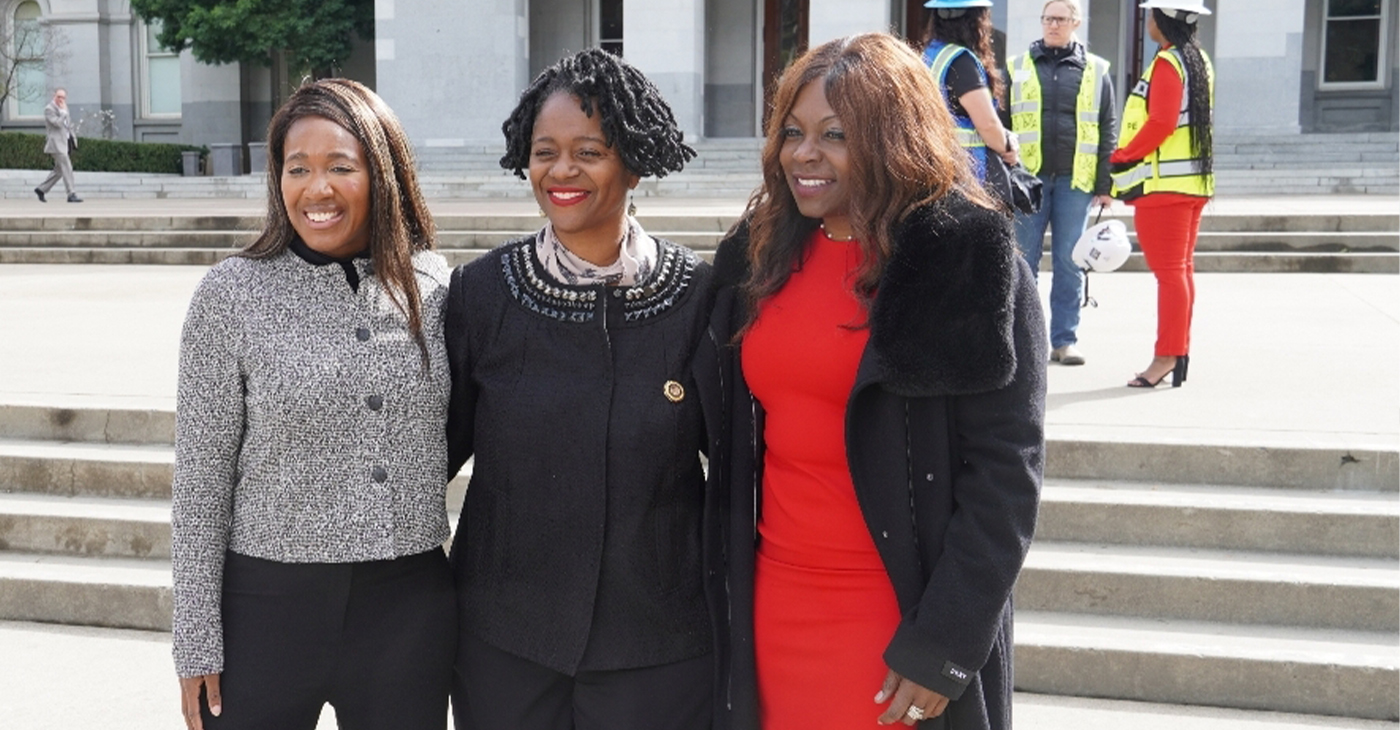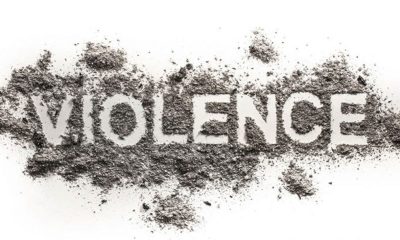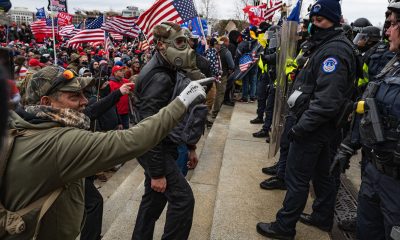National
The Loud Silence of Rape Survivors
By Jazelle Hunt
NNPA Washington Correspondent
FOURTH IN A SERIES
WASHINGTON (NNPA) – An online survey of sexual assault survivors conduced as part of this series vividly captures the fear and reluctance Black women rape survivors exhibit about sharing their ordeal with others:
From a young woman, drugged and raped by a man she met at a party at age 21:
“I told someone, but I never gave specifics because I felt like they would think it was my fault.”
From a middle-aged woman, repeatedly raped by a classmate’s father at age 6:
“When it first happened, we told our teacher and the [school] nurse. We were told that we were making it up. He told me that if I told anyone, he’d kill my whole family. I was scared for weeks after telling my family.”
From a young woman, raped by her then-boyfriend’s older brother at age 15:
“I never told anyone, not even my boyfriend, until I started talking to a therapist on campus during my sophomore year of college…to this day he doesn’t know.”
From a mature woman, raped at ages 12 and 13 and fondled by a pastor at age 15:
“I never said a word. Because in the end, I blamed myself. How do you know to blame yourself at 12 years old?”
Data from the Department of Justice shows that Black women are less likely than other women to report rape and assaults to police or tell anyone what happened.
Why?
About 80 percent of rapes happen between people of the same race. For Black women survivors whose assailants are also Black, cultural codes can make it difficult to speak out.

Black men vs. Black women
“We in Black communities don’t talk about [sexual assault] because of this pressure to protect the race,” says Aishah Shahidah Simmons, a survivor, educator, activist, and director of “NO! The Rape Documentary,” an international award-winning film that explores sexual violence within in the Black community.
The Philadelphia native explained, “[Black women] are valuable when we’re concerned about protecting our men and our children and our communities, but when it comes to talking about the violence that we’ve experienced at the hands of the men in our communities, then we’re traitors.”
Many have absorbed this message, including survivors. For example, Tiffany Perry, a native of Jersey City, N.J., was surprised to hear her mother’s opinion on the Bill Cosby sexual assault allegations.
“My mom is in support of Bill Cosby, she thinks he’s being sabotaged. She’s leaning more on the side of politics…. And I told her, ‘I can’t believe you, a person who has experienced a rape, would be in support of him,’” Perry said.
“You hear all of these women, particularly Black women – ‘Oh, they should’ve said something a long time ago. They just this, and gold-digger that.’ But if these women had said something, who’s to say these women wouldn’t have gotten railroaded then like they are getting railroaded now?”
On top of the expectation to be supportive of Black men, beliefs about what constitutes ideal Black womanhood, including inexhaustible emotional strength and perfect sexual respectability, can add to the trauma for Black women.
After Sharita Lee was raped at age 20 by a childhood friend, she didn’t know what to do. He had attacked her after hours of reminiscing and catching up, and immediately after a sudden phone call that brought news of her grandfather’s death. He was so abrupt that he had interrupted his own condolences when he pinned her to the couch.
“A reason in why I never told was because – in his particular case – as he began to rape me, I felt pleasure. And I knew I was not supposed to be feeling pleasure because I was being raped,” she says nervously. “In the moment, I felt confused, I felt stupid, because – you know? It’s almost like, do I just say ‘forget it’ that he’s raping me, to enjoy it, or not? So for me, I couldn’t even admit it. This is probably the first time I’m admitting it out loud, ever.”

Distrust of mainstream systems
There are other reasons Black women are less likely to vocalize their pain, including a deep distrust law of both the criminal justice system and the medical community.
Much has been written, for example, of J. Marion Simms, “The Father of Gynecology” who developed his technique by experimenting on enslaved women, without anesthesia, arguing that they could bear levels of pain that White women could not.
Perhaps the most notable incident that gave African Americans pause was the famous Tuskegee syphilis study from 1932-1947 in which treatment for 399 Black men was intentionally withheld even after it was discovered that penicillin was effective in treating the disease.
And there are other reasons for widespread distrust.
The Institute of Medicine report, “Unequal Treatment: Confronting Racial and Ethnic Disparities in Healthcare,” concluded that “(al)though myriad sources contribute to these disparities, some evidence suggests that bias, prejudice, and stereotyping on the part of healthcare providers may contribute to differences in care.”
Furthermore, the National Alliance on Mental Illness (NAMI), a national advocacy and education organization, notes that Black people are less likely to be accurately diagnosed and receive thorough treatment than their White counterparts; are less likely to receive culturally aware care; and are more likely to harbor stigmas about mental illness and treatment.
When Black women develop mental and emotional trouble after an assault, their strength is called into question, as if the pain is a sign of weakness.
“[The term ‘strong Black woman’] denies us of our humanity,” Simmons explained. “This is something – I’ve observed – that plays a role in Black women being able to be raped without recourse. Because it’s like, ‘We can take it, we’re strong, we’re not vulnerable or fragile.’”
As for law enforcement, Blacks and Latinos are incarcerated at disproportionately higher rates in part because police target them for minor crimes, according a report titled, “Black Lives Matter: Eliminating Racial Inequity in the Criminal Justice System” by the Sentencing Project, a Washington-based organization that works for a fair and effective U.S. criminal justice system by promoting reforms in sentencing policy, addressing unjust racial disparities and practices, and advocating for alternatives to incarceration.
In addition, a recent ACLU report found, “Once arrested, people of color are also likely to be charged more harshly than whites; once charged, they are more likely to be convicted; and once convicted, they are more likely to face stiff sentences – all after accounting for relevant legal differences such as crime severity and criminal history.”
For Tiffany Perry, it was more personal than a philosophical distrust of the criminal justice system. At 21 years old, she was the victim of an attempted rape by a police officer. The married policeman was also her co-worker, and her usual ride home after work. One evening, he cornered her in a secluded makeshift office and pinned on a couch where officers slept between shifts.
“I’m saying, ‘Stop! Stop, get off of me what are you doing? I’m going to scream!’ And he says, ‘Go ahead, who’s going to save you, you’re in a police station.’ When he said that to me I just froze. I was like, ‘Wow, I am. Nobody’s going to do anything,’” she remembered.
After groping her for a few more minutes, her assailant suddenly changed his mind, releasing her.
“The thing is – when we left there, I got in the car with him. And I tried to explain this…I was so afraid of him that I got in the car with him,” Perry says. “To people, that doesn’t make any sense…but when he said, ‘Nobody’s going to hear you, and nobody’s going to believe you,’ I convinced myself that he was right. I felt like I should’ve known better.”
She never reported the incident. Two years later, she was able to tell her mother, who had been raped and had become pregnant with her at age 15.
“I didn’t want to be scrutinized, I didn’t want to be under the limelight. I didn’t want to relive it. I didn’t want to talk about it,” Perry said. “Even now I have feelings of guilt…what if, because I didn’t say nothing, this guy went further with some other young lady? Or, maybe I wasn’t the first…maybe the person before me, she didn’t seem mad either, so that’s what made him think it was okay to do that to me.
“You say to yourself, you don’t know what’s right or wrong. You just do what you can, or know how to do in that moment.”
NEXT WEEK: Life after Rape
Part I: Rape and the Myth of ‘The Strong Black Woman’
Part III: Some Faith Leaders Victimize Survivors Again
(The project was made possible by a grant from the National Health Journalism Fellowship, a program of the University of Southern California Annenberg School for Communication and Journalism.)
###
Activism
Oakland Post: Week of March 28 – April 1, 2025
The printed Weekly Edition of the Oakland Post: Week of March 28 – April 1, 2025

To enlarge your view of this issue, use the slider, magnifying glass icon or full page icon in the lower right corner of the browser window.
Activism
Sen. Lola Smallwood-Cuevas Honors California Women in Construction with State Proclamation, Policy Ideas
“Women play an important role in building our communities, yet they remain vastly underrepresented in the construction industry,” Smallwood-Cuevas stated. “This resolution not only recognizes their incredible contributions but also the need to break barriers — like gender discrimination.

By Antonio Ray Harvey, California Black Media
To honor Women in Construction Week, Sen. Lola Smallwood-Cuevas (D-Los Angeles), a member of the California Legislative Black Caucus (CLBC), introduced Senate Concurrent Resolution (SCR) 30 in the State Legislature on March 6. This resolution pays tribute to women and highlights their contributions to the building industry.
The measure designates March 2, 2025, to March 8, 2025, as Women in Construction Week in California. It passed 34-0 on the Senate floor.
“Women play an important role in building our communities, yet they remain vastly underrepresented in the construction industry,” Smallwood-Cuevas stated. “This resolution not only recognizes their incredible contributions but also the need to break barriers — like gender discrimination.
Authored by Assemblymember Liz Ortega (D-San Leandro), another bill, Assembly Concurrent Resolution (ACR) 28, also recognized women in the construction industry.
The resolution advanced out of the Assembly Committee on Rules with a 10-0 vote.
The weeklong event coincides with the National Association of Women In Construction (NAWIC) celebration that started in 1998 and has grown and expanded every year since.
The same week in front of the State Capitol, Smallwood, Lt. Gov. Eleni Kounalakis, Assemblymember Josh Hoover (R-Folsom), and Assemblymember Maggie Krell (D-Sacramento), attended a brunch organized by a local chapter of NAWIC.
Two of the guest speakers were Dr. Giovanna Brasfield, CEO of Los Angeles-based Brasfield and Associates, and Jennifer Todd, President and Founder of LMS General Contractors.
Todd is the youngest Black woman to receive a California’s Contractors State License Board (A) General Engineering license. An advocate for women of different backgrounds, Todd she said she has been a woman in construction for the last 16 years despite going through some trying times.
A graduate of Arizona State University’s’ Sandra Day O’Connor College of Law, in 2009 Todd created an apprenticeship training program, A Greener Tomorrow, designed toward the advancement of unemployed and underemployed people of color.
“I always say, ‘I love an industry that doesn’t love me back,’” Todd said. “Being young, female and minority, I am often in spaces where people don’t look like me, they don’t reflect my values, they don’t reflect my experiences, and I so persevere in spite of it all.”
According to the U.S. Bureau of Labor Statistics, only 11.2% of the construction workforce across the country are female. Overall, 87.3% of the female construction workers are White, 35.1% are Latinas, 2.1% are Asians, and 6.5% are Black women, the report reveals.
The National Association of Home Builders reported that as of 2022, the states with the largest number of women working in construction were Texas (137,000), California (135,000) and Florida (119,000). The three states alone represent 30% of all women employed in the industry.
Sen. Susan Rubio (D-Baldwin Park) and the California Legislative Women’s Caucus supported Smallwood-Cuevas’ SCR 30 and requested that more energy be poured into bringing awareness to the severe gender gap in the construction field.
“The construction trade are a proven path to a solid career. and we have an ongoing shortage, and this is a time for us to do better breaking down the barriers to help the people get into this sector,” Rubio said.
Activism
Report Offers Policies, Ideas to Improve the Workplace Experiences of Black Women in California
The “Invisible Labor, Visible Struggles: The Intersection of Race, Gender, and Workplace Equity for Black Women in California” report by the California Black Women’s Collective Empowerment Institute (CBWCEI), unveiled the findings of a December 2024 survey of 452 employed Black women across the Golden State. Three-fifths of the participants said they experienced racism or discrimination last year and 57% of the unfair treatment was related to incidents at work.

By McKenzie Jackson, California Black Media
Backed by data, a report released last month details the numerous hurdles Black women in the Golden State must overcome to effectively contribute and succeed in the workplace.
The “Invisible Labor, Visible Struggles: The Intersection of Race, Gender, and Workplace Equity for Black Women in California” report by the California Black Women’s Collective Empowerment Institute (CBWCEI), unveiled the findings of a December 2024 survey of 452 employed Black women across the Golden State. Three-fifths of the participants said they experienced racism or discrimination last year and 57% of the unfair treatment was related to incidents at work.
CBWCEI President and CEO Kellie Todd Griffin said Black women have been the backbone of communities, industries, and movements but are still overlooked, underpaid, and undervalued at work.
“The data is clear,” she explained. “Systemic racism and sexism are not just historical injustices. They are active forces shaping the workplace experiences of Black women today. This report is a call to action. it demands intentional polices, corporate accountability, and systemic changes.”
The 16-page study, conducted by the public opinion research and strategic consulting firm EVITARUS, showcases the lived workplace experiences of Black women, many who say they are stuck in the crosshairs of discrimination based on gender and race which hinders their work opportunities, advancements, and aspirations, according to the report’s authors, Todd Griffin and CBWCEI researcher Dr. Sharon Uche.
“We wanted to look at how Black women are experiencing the workplace where there are systematic barriers,” Todd Griffin told the media during a press conference co-hosted by Ethnic Media Services and California Black Media. “This report is focused on the invisible labor struggles of Black women throughout California.”
The aspects of the workplace most important to Black women, according to those surveyed, are salary or wage, benefits, and job security.
However, only 21% of the survey’s respondents felt they had strong chances for career advancement into the executive or senior leadership ranks in California’s job market; 49% felt passed over, excluded from, or marginalized at work; and 48% felt their accomplishments at work were undervalued. Thirty-eight percent said they had been thought of as the stereotypical “angry Black woman” at work, and 42% said workplace racism or discrimination effected their physical or mental health.
“These sentiments play a factor in contributing to a workplace that is unsafe and not equitable for Black women in California,” the report reads.
Most Black women said providing for their families and personal fulfillment motivated them to show up to work daily, while 38% said they were dissatisfied in their current job with salary, supervisors, and work environment being the top sources of their discontent.
When asked if they agree or disagree with a statement about their workplace 58% of Black women said they feel supported at work, while 52% said their contributions are acknowledged. Forty-nine percent said they felt empowered.
Uche said Black women are paid $54,000 annually on average — including Black single mothers, who averaged $50,000 — while White men earn an average of $90,000 each year.
“More than half of Black families in California are led by single Black women,” said Uche, who added that the pay gap between Black women and White men isn’t forecasted to close until 2121.
-

 Activism4 weeks ago
Activism4 weeks agoUndocumented Workers Are Struggling to Feed Themselves. Slashed Budgets and New Immigration Policies Bring Fresh Challenges
-

 Activism1 week ago
Activism1 week agoWe Fought on Opposite Sides of the Sheng Thao Recall. Here’s Why We’re Uniting Behind Barbara Lee for Oakland Mayor
-

 Activism4 weeks ago
Activism4 weeks agoOakland Post: Week of March 5 – 11, 2025
-

 #NNPA BlackPress2 weeks ago
#NNPA BlackPress2 weeks agoRev. Dr. Jamal Bryant’s Black Church Target Boycott Mobilizes 150,000
-

 Activism2 weeks ago
Activism2 weeks agoSan Francisco Is Investing Millions to Address Food Insecurity. Is Oakland Doing the Same?
-

 #NNPA BlackPress4 weeks ago
#NNPA BlackPress4 weeks agoTrump Moves to Dismantle Education Department
-

 #NNPA BlackPress4 weeks ago
#NNPA BlackPress4 weeks agoFighting to Keep Blackness
-

 #NNPA BlackPress2 weeks ago
#NNPA BlackPress2 weeks agoRecently Approved Budget Plan Favors Wealthy, Slashes Aid to Low-Income Americans




























































Pingback: Some Faith Leaders Victimize Rape Survivors Again | BlackPressUSA
Pingback: Some Faith Leaders Victimize Rape Survivors Again | BlackPressUSA
Pingback: Beyond Survival: Life After Rape | BlackPressUSA
Pingback: Beyond Survival: Life After Rape | BlackPressUSA